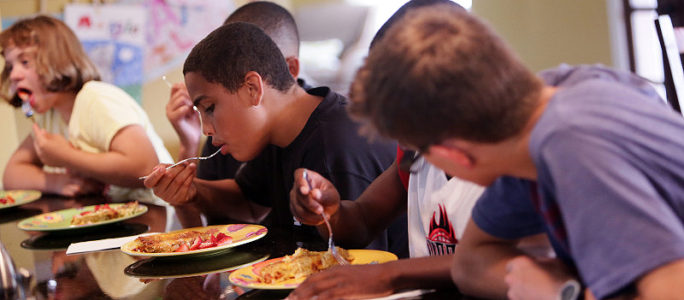The benefits of eating family meals together are well documented – better grades, healthier eating habits, and stronger parent-child relationships. We envision that our meals will be happy, social times with our families. But the reality is often very different.
For parents who have concerns about their child’s eating habits or nutrition, there can be added pressure during meals. Mealtimes can become power struggles. Over time, these power struggles can become overwhelming for the entire family and interfere with the overall positive benefits listed above.
How do you make mealtimes better after what may have been years of frustration? Here are some ideas to keep meals positive for the entire family:
7 Tips For Making Mealtimes Less Stressful
- Involve your child in the meal preparation and clean up Kids often love cooking and helping with meals. Find age-appropriate ways to let them help, such as stirring, cutting and serving. Cooking makes it easy to learn about food without having to eat it. Even young kids can help with setting the table!
- Establish family mealtime rules Having set rules may help lessen power struggles. Involve the entire family in coming up with rules and make sure the expectations are clear before sitting down to eat. Let the kids make a poster or a flyer and hang them up where everyone can see them during the meal. Rules can be simple, such as:
– Stay seated for 15 minutes
– Keep food on the plate
– Cleaning up is everyone’s responsibility - Enjoy family discussions that do not revolve around the food Make it a point to talk about fun parts of your day and ask your child questions about their day. A fun activity could be “question of the day” where every family member takes a turn answering the question. Have fun during meals!
- Give your child some control
For many children, mealtime battles are about control. Offer choices instead of asking yes/no questions. For example, offer choices about what plate they will eat from, the number of bites of the food that will go on their plates, or choosing how they would like to help set up the meal. - Point out good behavior Look for positive things your children are doing during the meal. Praise simple things, such as when your children keep a food they do not like on their plate or stay seated during the meal.
- Try to remain calm There will be times that meals do not go well even when you have done everything right. When your child is misbehaving, try to stay calm.
- Give yourself credit Setting a clear mealtime structure with family rules and fewer power struggles can be the first step to making mealtime better for your family. Your children may not change their eating habits overnight. But sticking with this plan may help your children to try new foods and ultimately make mealtimes happier.
These suggestions for making mealtimes less stressful may seem like common sense, but can sometimes be challenging to implement. Outside guidance and support can be valuable, especially when you’re finding meals to be more stressing than relaxing.
If you have any concerns about your child’s eating habits, speak to your child’s primary care physician. He or she may refer your child for a feeding evaluation, which can include medical professionals as well as therapists from occupational therapy, speech language pathology and social work.
Editor’s note: This blog post was written in collaboration with Karen Rizzo, Speech-Language Pathologist.






thanks for the great suggestions!
Jon